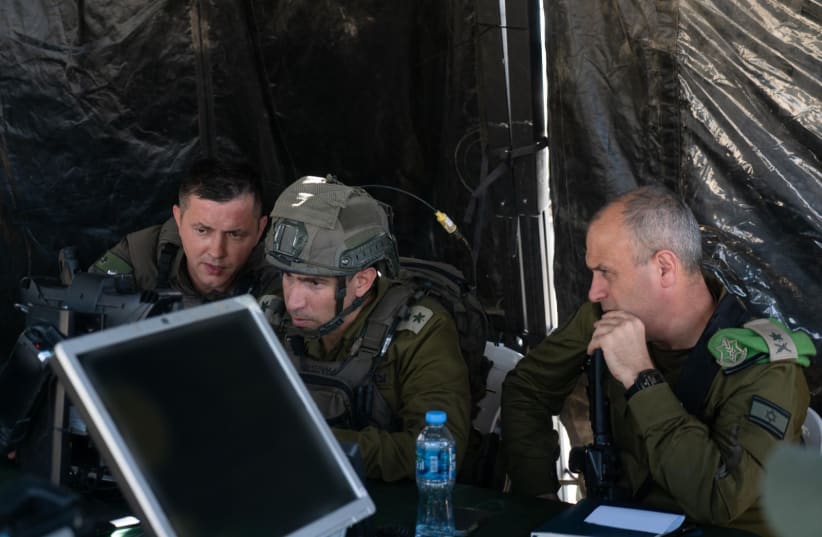News
What is new about latest IDF intel. disclosure failures?

“We have known for several months…one could not help but view many of the disclosures as an attempt by the media to reinvent a story.”

At first glance, the big splash from KAN News on Monday night about new revelations of IDF intelligence failures related to October 7 seemed overblown.

For several months already, we have been aware of an extensive, detailed list of those failures, and as a journalist, I could not help but view many of the new disclosures as an attempt by the media to reinvent a story that was mostly written on a day when some editors must have felt they were short on news.
But at a second glance, there were two important points from the list of “revelations” that should influence how the Israeli intelligence community will be reconfigured and rebuilt in the coming months and years.
Previous reports regarding warnings of a Hamas invasion have shown that in September 2023, “V,” a junior-level intelligence officer in Unit 8200, warned her supervisor, Lt. Col. “A,” about the terrorist organization’s plans. The IDF has struggled to explain why it ignored those warnings.
“A” either did not pass on the warnings to the then-IDF intelligence chief, Maj.-Gen. Aharon Haliva, or he passed them on only sometime on October 3, in a vague fashion.
IDF underestimated Hamas’s invasion plans
The bottom line until now was that Unit 8200 neither widely shared nor put any special emphasis on the warnings.
The two new pieces of information were the detailed number of hostages to be kidnapped, as well as the idea that the IDF Southern Command knew about the latest warnings from Unit 8200.
One of the reasons that Unit 8200 and others in IDF intelligence did not take the warnings about a Hamas invasion seriously, they said, was because they were warned of potential danger in April 2023. It turned out to be a false alarm, and the action taken to prevent it was viewed as a waste of resources.
Based on that and on the idea that V did not have any idea when the Hamas invasion would take place – within days, months, or years – most viewed the intelligence as not “actionable” and as something that might only matter if there were more specifics.
One interpretation of the latest report is that Unit 8200 finally got some additional specifics, including the exact number of hostages Hamas would try to take.
Although the exact timing was still far from clear, the level of specificity of how many hostages to take could have led more intelligence officials to believe that Hamas’s planning was in a very advanced state and may be imminent.
This could have given Unit 8200 and other IDF intelligence officials sufficient backing for pushing the rest of the defense establishment harder to invest in preparing to defend against an invasion (which otherwise might be viewed as wasting resources on a non-existent threat).
The second new piece of information is the suggestion that someone in the IDF Southern Command did know about the invasion plans. This contradicts earlier reports, according to which the IDF Southern Command claimed it knew nothing about V and her warnings.
These latest allegations have firmly placed some knowledge of the invasion threat beyond IDF intelligence and into IDF Southern Command.
Ultimately, however, The Jerusalem Post has learned that the latest leaked Hamas invasion warning did not reach the top officials in the Southern Command, including the commander, Maj.-Gen. Yaron Finkleman, Brig.-Gen. Avi Rosenfeld, and IDF Southern Command Intelligence Chief Col. “A.”
This means that this second new fact may be less significant than the new information about the number of hostages.
Alternatively, if Unit 8200 failed to relay numerous warnings to the Southern Command, and if lower officers within the Southern Command failed to share all intelligence with their higher-up supervisors, it raises fundamental questions about the cooperation between the various units, and whether the Southern Command was providing sufficient safe space for lower-tier analysts to present dissonant information.
These are perhaps the most crucial questions for the future:
How can the intelligence establishment’s culture and structure be modified to ensure that dissonant opinions reach all relevant officials in the future and that such warnings, even if a long shot, are taken seriously.

News
Collapse rumours diversionary, but undeterred – Wike

The Honourable Minister of the Federal Capital Territory (FCT), Barr. Ezenwo Nyesom Wike, has dismissed as baseless and diversionary, widespread rumours about his collapse and being rushed abroad for treatment.

Speaking to journalists in Abuja on Thursday, following a routine inspection of ongoing infrastructure projects slated for commissioning in May to commemorate President Bola Ahmed Tinubu’s second anniversary in office, Barrister Wike categorically denied the claims, saying that they were untrue.

He attributed the spread of these rumours to political machinations, specifically pointing to those he alleged, sought to divert attention from serious allegations of planned attacks on national assets, including the Rivers State House of Assembly complex as revealed by a former Head of Service of Rivers State government.
He said, “What happened was that the former Head of Service of Rivers State government came out to let the public know what was going on about a plan to bomb the House of Assembly complex and attack national assets. To divert the attention of people from focusing on that, they had to bring up rumours that I had been flown overseas. There was never a time I collapsed, there was never a time anybody took me overseas”.
The Minister said he was focused on his job of providing good governance in the FCT and would not be distracted by such unfounded rumours.
Barr. Wike emphasized his continued public engagements, citing his presence at the President’s Iftar engagement and his leading of Abuja residents during the Sallah homage to the President as evidence of his robust health. “You see me every day. The day Mr. President broke Iftar during his birthday, I was there. The next day, I led Abuja residents to pay Sallah homage. I see so many stories online, this is politics. Those things don’t bother us. We are not distracted. We are focused on our jobs.”
He thanked Nigerians for their concern but cautioned against wishing ill health on others, reiterating that only God determines the time of one’s passing. “I thank Nigerians for showing concern, but people should not wish their fellow human beings such a thing to happen. We know that we will die one day, nobody will remain in this world forever, but it’s only God who determines the day you will die. No human being can say you will die today or tomorrow. So, don’t bother yourself, I’m very agile and I can assure you that I will write the condolence letters for those peddling these rumours.”
Speaking on the infrastructure projects he inspected, Barr. Wike expressed satisfaction with the progress of work at the International Conference Centre (ICC) renovation, the Arterial road N16 in Gishiri and its interchange connecting Maitama District to Katampe, and the Judges Quarters and its access roads in Katampe District.
He said, “We were at the International Conference Centre where much work has been done. They are keeping to the time that they have given and they are also doing a good quality job. We’ve gone to Gishiri and the roads leading to the Justices Quarters. I’m very much impressed with the good jobs and the contractors handling these projects. You can attest to the fact that this is a quality job being carried out”.
He commended the contractors, including Julius Berger and CGC, for their commitment to delivering the projects on schedule and assured that funding, with the support of President Tinubu, was not a challenge.
He encouraged taxpayers to fulfill their obligations, promising that they will witness the tangible results of their contributions. “All we will say is that those who are supposed to pay their taxes should pay their taxes, and ask us what we are doing with taxpayers’ money. They can see what we are doing with taxpayers’ money.”

News
Supreme Court sacks Abure, says leadership is party affair

The Supreme Court has sacked Julius Abure as National Chairman of the Labour Party in a ruling that was delivered on Friday in Abuja.

The judgment has put paid to a prolonged legal battle of the party. In a unanimous judgment, In a delivered by a five-member panel, held that the Court of Appeal had overstepped its jurisdiction when it declared Abure as the party’s leader.

The Supreme Court ruled that the issue of party leadership is an internal affair beyond the jurisdiction of the courts, thereby overturning the lower court’s ruling. This decision has significant implications for the Labour Party, which has been embroiled in leadership tussles in recent months.
The judgment came after an appeal filed by Senator Nenadi Usman and another appellant, challenging Abure’s claim to the chairmanship. The court found their appeal meritorious and accordingly upheld it, solidifying the legal stance that party leadership disputes should be settled within party structures rather than through litigation.
In a further blow to Abure’s camp, the Supreme Court dismissed a cross-appeal filed by his faction of the Labour Party, describing it as lacking merit.
With this ruling, the legal battles surrounding the leadership of the Labour Party may have reached their final chapter, barring any internal resolutions or new legal maneuvers by the affected parties.
The verdict has sparked reactions from political analysts and party stakeholders, with some expressing concerns over the stability of the Labour Party ahead of the next electoral cycle. The party, which emerged as a formidable force in the 2023 general elections, now faces the challenge of reorganizing its leadership and uniting its members.
While the ruling may settle the legal aspect of the dispute, the political ramifications are far from over.
Party members and loyalists of Abure may seek internal resolutions or political realignments to navigate the fallout of this decision. The Labour Party’s next steps will be crucial in determining its future strength and cohesion on the national stage.
As of press time, Abure’s camp has not issued an official statement on the ruling, while other factions within the party have welcomed the decision, calling it a victory for internal democracy.

News
Supreme Court Verdict: A Triumph for democracy, unity of Nigeria – LP NCC

In a landmark ruling today, the Supreme Court of Nigeria delivered a judgment that has been hailed as a significant victory not only for the Labour Party (LP) but also for Nigeria’s democracy. The ruling, which saw the removal of Mr. Julius Abure as the National Chairman of the Labour Party, is widely regarded as a triumph of democracy, the rule of law, and the resilience of Nigeria’s judicial system.

The statement celebrating the historic judgment was issued by the Labour Party National Caretaker Committee Secretary, Sen. Darlington Nwokocha who was present at the Supreme Court in Abuja during the judgment. The Secretary expressed immense gratitude to the Justices of the Supreme Court for their fair and forthright decision, which was described as a beacon of hope for the country’s democracy.

“This ruling is a monumental victory for the Labour Party and, more importantly, for the future of Nigeria’s democracy,” said the Secretary. “It demonstrates that the Judiciary remains the last hope for the common man, ensuring that justice and the rule of law prevail in the face of challenges.”
The Labour Party National Caretaker Committee (LP NCC) emphasized that the judgment is a clear indication that despite the struggles Nigeria faces, the nation’s democracy is resilient, and the judicial system remains a pillar of strength. It is also seen as a crucial step towards unifying the party and fostering an environment conducive to political reform and nation-building.
“This historic ruling is not only a victory for the Labour Party, but also for the Nigerian people and our democracy. It affirms that the rule of law will always be upheld,” the statement continued. “We now have an opportunity to rebuild Nigeria’s democracy and strengthen our party, which remains the political party of choice for millions of Nigerians.”
The Labour Party extended a call to all Nigerians, irrespective of political affiliation, to unite with the party in its efforts to restore and rebuild the nation’s democracy. “We call on all Nigerians to join hands with the Labour Party in the mission to restore the true values of democracy, justice, and equity in Nigeria,” the statement urged.
The judgment is being seen as a significant milestone not only for the Labour Party but for the entire nation, as it underscores the importance of a free, fair, and independent judiciary in maintaining democratic principles. The ruling have now firmly brought to an end the perennial leadership crisis within the Labour Party, enabling it to focus more effectively on its agenda for a better Nigeria.
The Labour Party also took this moment to express their deep appreciation to their supporters for their unwavering dedication and solidarity. “We thank Nigerians for their resilience, support, and trust in our cause. The Labour Party remains the people’s party, and together, we will continue to fight for a more just, equitable, and prosperous Nigeria,” the Secretary concluded.
As the Labour Party moves forward, it is committed to uniting its members and supporters to build a Nigeria free from oppression, where justice and fairness are upheld for all. The Supreme Court’s ruling today serves as a powerful reminder that in Nigeria, the law is supreme, and democracy will always triumph.

-

 Security6 days ago
Security6 days agoNew Commissioner of Police in Niger, Elleman sends strong warning to criminals
-

 News5 days ago
News5 days agoAbia: LG Chairman, Iheke accused of using soldiers to detain IRS agent, claims Governor Otti’s support
-

 News6 days ago
News6 days agoKogi Governor, Ahmed Usman Ododo salutes Tinubu at 74
-

 News4 days ago
News4 days agoKogi government bans rallies ahead of Natasha’s homecoming slated for Tuesday
-

 News6 days ago
News6 days agoPlateau LP stakeholders endorses Barr Gyang Zi’s defection to APC
-

 News4 days ago
News4 days agoIran may secure a deal before Trump’s deadline – or face Israeli strikes in Tehran – analysis
-

 News6 days ago
News6 days agoAkpabio pays historic visit to office of SA to President on Senate Matters
-

 Business6 days ago
Business6 days agoFCT Minister reveals how he would aggressively pursue revenue collection, tours infrastructure





















